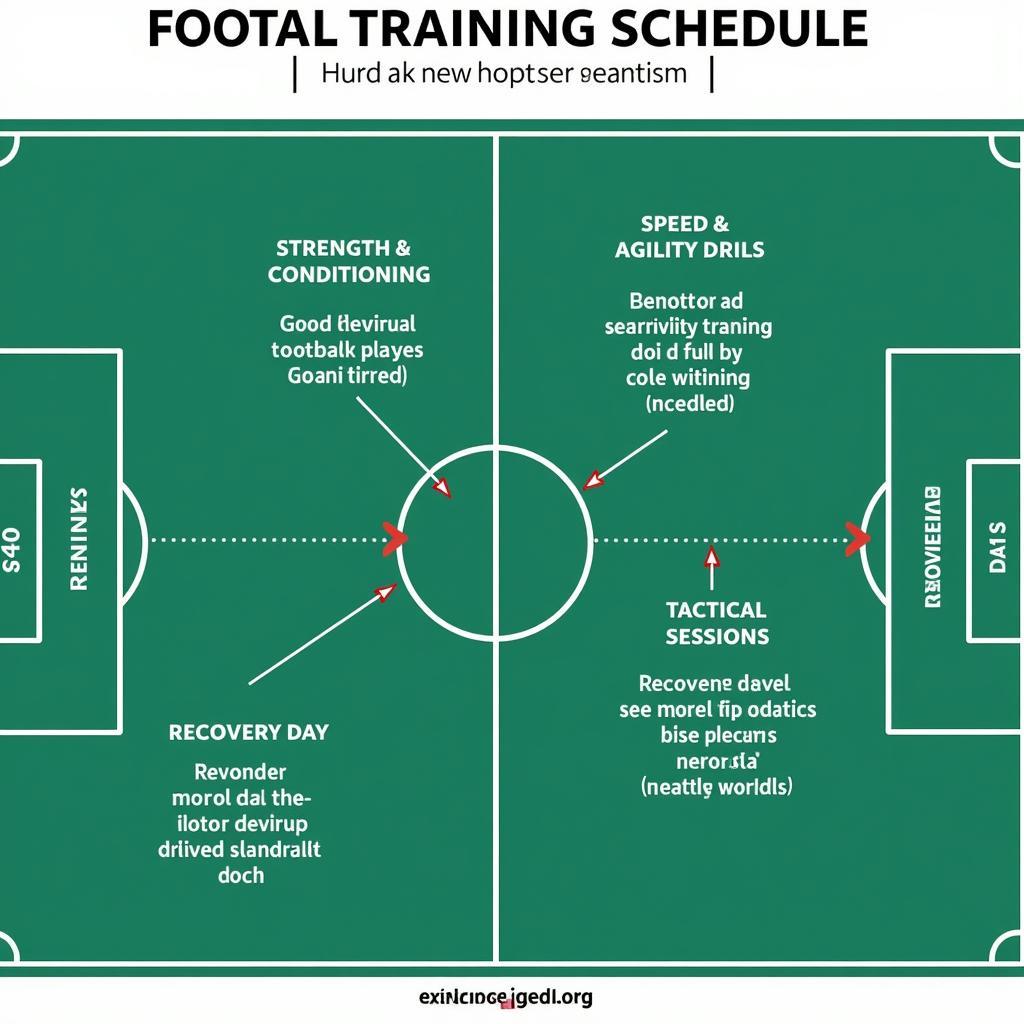The Winning Formula: A Footballer’s Guide to Diet and Training
October 16, 2024As a professional footballer constantly striving to reach peak performance, I understand the critical role that diet and training play in my journey. It’s not just about natural talent; it’s about consistently fueling and conditioning your body to meet the demands of this incredible sport. In this comprehensive guide, I’ll share insights into the training regimen and nutritional strategies that empower me to dominate on the field.
 Footballer Training Schedule
Footballer Training Schedule
The Building Blocks of a Powerful Physique: Strength and Conditioning
Strength and conditioning are the cornerstones of a footballer’s physical prowess. Our training incorporates a variety of exercises designed to build explosive power, enhance endurance, and improve overall athleticism.
- Plyometrics: Exercises like box jumps, squat jumps, and bounding drills are staples in our routines, boosting our ability to generate force quickly. This translates directly to faster sprints, higher jumps to win headers, and the agility to outmaneuver opponents.
- Weightlifting: We focus on compound movements like squats, deadlifts, and bench presses to build overall muscle mass and strength. These exercises mimic the movements we perform on the field, enhancing our ability to handle physical challenges during matches.
- Core Work: A strong core is essential for balance, stability, and injury prevention. Plank variations, medicine ball rotations, and stability ball exercises are incorporated to develop this crucial area.
Fueling the Machine: The Importance of a Balanced Diet
Just as a car needs the right fuel to perform optimally, so does a footballer’s body. My diet is carefully structured to provide the energy I need for intense training sessions and match days while supporting muscle growth and recovery.
- Carbohydrates: As the primary source of energy, complex carbohydrates like brown rice, quinoa, and whole-wheat pasta are staples in my diet. These provide a sustained release of energy, ensuring I can maintain high intensity throughout training and matches.
- Protein: Crucial for muscle repair and growth, lean protein sources like chicken, fish, eggs, and beans feature heavily in my meals. Adequate protein intake helps my body recover effectively after strenuous activity, preparing me for the next challenge.
- Healthy Fats: Don’t be afraid of fats! Healthy fats found in avocados, nuts, and olive oil are essential for hormone production and overall well-being. They also contribute to feeling satiated, which is important for managing weight and energy levels.
- Hydration: Staying properly hydrated is paramount, especially during intense training sessions. I make sure to consume plenty of water throughout the day to replace fluids lost through sweat and maintain optimal performance.
Recovery and Injury Prevention: Listening to Your Body
Training hard is essential, but so is allowing your body adequate time to recover and rebuild.
- Sleep: I prioritize getting 8-9 hours of quality sleep each night. This allows my body to repair muscle tissue, replenish energy stores, and prepare for the next day’s demands.
- Active Recovery: Incorporating low-impact activities like swimming or cycling on rest days helps promote blood flow, reduce muscle soreness, and aids in recovery without putting excessive strain on the body.
- Stretching and Mobility: Regular stretching and mobility work are essential for maintaining flexibility, preventing injuries, and improving range of motion – crucial for executing movements with precision and power on the field.
Mental Fortitude: The Other Side of the Game
While physical conditioning is paramount, the mental game is just as crucial for success in football.
- Focus and Concentration: Maintaining focus during matches is key. I use visualization techniques to mentally rehearse scenarios and maintain concentration when the pressure is on.
- Discipline and Determination: Training consistently, even when it’s tough, requires immense discipline and determination. It’s about pushing through challenges and maintaining a strong work ethic to achieve your goals.
- Teamwork and Communication: Football is a team sport, and effective communication on the field is vital. I believe in fostering strong relationships with my teammates, building trust and understanding to enhance our performance as a unit.
This winning formula – encompassing rigorous training, a balanced diet, adequate recovery, and mental resilience – has been instrumental in my journey to becoming a top footballer. Remember, success on the field is a product of dedication, hard work, and a holistic approach to your physical and mental well-being.